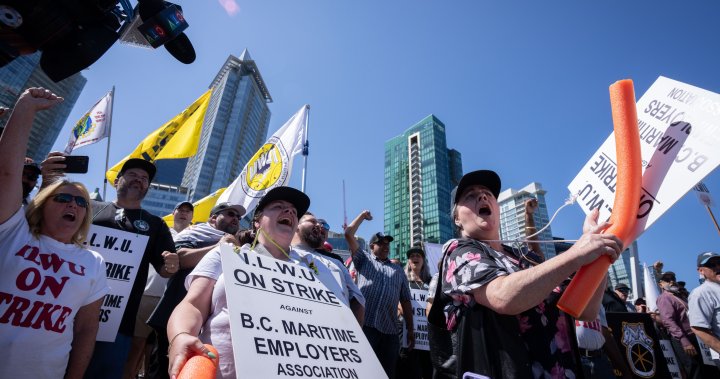
End B.C. port strike, CFIB urges Ottawa, as half of businesses impacted
Global News
The Canadian Federation of Independent Business is calling for an end to the B.C. port strike that it says has impacted half of its members.
The Canadian Federation of Independent Business says “enough is enough” when it comes to the ongoing work stoppage at B.C. ports and is calling for an end to the strike that it says has affected half of small businesses in the country.
Tuesday marks the 11th day of the strike among B.C. cargo loaders, a disruption that has seen shipping containers pile up at some of Canada’s busiest ports. More than 7,400 workers walked off the job on Canada Day as they push for better wages and job security from B.C. maritime employers.
Since July 6, more than half (53 per cent) of the roughly 1,400 business owners surveyed by the Canadian Federation of Independent Business (CFIB) say their operations have been affected amid the strike. Some 16 per cent said the strike wouldn’t affect their businesses, while 31 per cent said they weren’t sure of the impact.
The CFIB says that among the affected businesses are an Ontario retailer waiting for shipments of clothes and footwear to stock up ahead of the back-to-school season, as well as an Albertan construction company that needs steel to finish projects on time.
Experts who spoke to Global News say the Port of Vancouver and more than 30 other maritime gateways on the west coast are critical to the functioning of Canada’s economy and are the primary ports for goods coming from and heading to Asia.
Canadians across the country might see the price of goods push higher the longer the strike goes on, experts have said. The work stoppage is disrupting $500 million in goods every day, estimates industry group Canadian Manufacturers and Exporters.
Saskatoon-based fertilizer company Nutrien Ltd. says it has curtailed production at its Cory potash mine due to the port workers strike in Vancouver and warned if the work stoppage continues it could affect its other potash mines in Saskatchewan.
“We’re hearing from members across the country who are worried about missing critical sales, delayed production or orders or an inability to get their products to export markets because of the strike,” said CFIB president Dan Kelly in a statement Tuesday.









